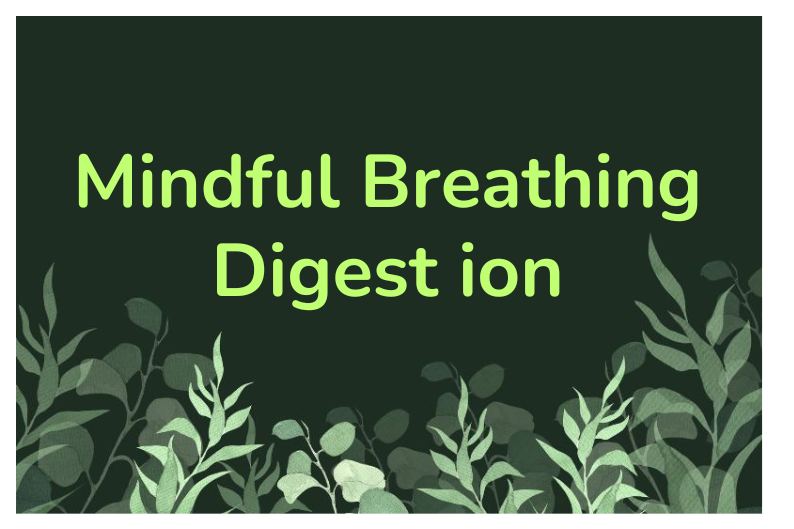
Mindful Breathing for Digestive Harmony via the Vagus Nerve
Breath and Digestion, Vagus Nerve, Gut Calm: How Mindful Breathing Supports Digestive Harmony
Breathing is more than something the body does automatically—it’s deeply connected to the way the gut works, thanks to the vagus nerve. When people learn to use breathing techniques to trigger the vagus nerve, they can help their body move from stress to calm and support healthier digestion. Natural health experts like Gary Brecka and Barbara O’Neil often talk about the power of breath for supporting the body’s “rest and digest” system, making this a key topic for anyone wanting a calmer gut.
The vagus nerve acts like a bridge between the brain and major organs, especially the stomach and intestines; when activated by practices like slow, deep belly breathing, it signals the body to relax and digest better. As the vagus nerve calms down, it can help lower stress, ease stomach upset, and even support a happier mood. MC Herbs, a trusted name in natural supplements, believes in supporting this natural process and offers herbal blends designed to help nurture your gut and nervous system together.
Digestive health isn’t just about what gets eaten; how people breathe, how calm they feel, and even small daily habits add up. Focusing on gentle, natural techniques and pairing them with supportive MC Herbs supplements can help many find lasting comfort and calm for their gut.
Key Takeaways
- The vagus nerve connects breath and digestion, creating a path for gut calm.
- Natural techniques can help people control stress and support better digestion.
- MC Herbs supplements offer added support for those seeking a calmer gut.
The Connection Between Breath, Digestion, and the Vagus Nerve
Breathing patterns have a powerful influence on the gut and mind. The vagus nerve acts as the main link in this relationship, helping regulate how the body relaxes, digests, and restores balance.
How the Vagus Nerve Links the Brain and Gut
The vagus nerve is the body’s longest cranial nerve, running from the brainstem to the heart, lungs, and digestive organs. It carries signals both ways, letting the gut send information to the brain and vice versa.
This nerve helps control major digestive functions like stomach acid, gut movement, and enzyme release. It is a key part of the body’s “rest and digest” system, quickly shifting the body out of stress mode. A strong vagus nerve keeps communication clear between the brain and the vast enteric nervous system—the network of nerves found in the gut itself. This helps balance gut bacteria and supports a healthy microbiome, affecting not just digestion but also mood and immunity. You can read more about the role of the vagus nerve in digestion and gut health.
Breath as a Tool for Digestive Calm
Slow, deep breathing immediately activates the vagus nerve, sending a signal to slow the heart rate and calm the body. When practiced regularly, breathwork helps lower tension in the digestive tract, which can reduce bloating or discomfort.
Experts like Gary Brecka suggest steady nasal breathing and controlled exhalations can improve gut function. These breathing habits support gut bacteria and lower stress chemicals, creating a friendlier environment for digestion. MC Herbs recommends deep breathing exercises in their gut health routine, and offers herbal supplements to further calm the digestive system naturally.
Try these simple steps for calming breath:
- Inhale slowly through your nose for 4 seconds
- Hold the breath briefly
- Exhale through the mouth for 6-8 seconds
- Repeat for 3-5 minutes
Consistent breathwork strengthens the vagus nerve connection and restores digestive balance. More details can be found at Breathwork and the Vagus Nerve.
Role of the Parasympathetic Nervous System in Gut Health
The parasympathetic nervous system is responsible for relaxing the body, slowing the heart, and boosting digestion. The vagus nerve is its main pathway. When this system is active, the body shifts into a healing mode where energy goes toward breaking down food and absorbing nutrients.
A calm parasympathetic state stops the body from staying in “fight-or-flight” mode, which can harm the gut over time. Strong vagus nerve signals help the digestive system rest and recover after stress, allowing the gut microbiome to rebalance. This, in turn, makes for healthier gut bacteria and improves overall gut health.
MC Herbs encourages supporting this system through herbs like lemon balm and chamomile, which have calming effects on both the nervous and digestive systems. For more about this connection, see Vagus Nerve: What It Is, Function, Location & Conditions.
Practical Techniques to Calm the Gut via the Vagus Nerve
Specific habits help improve gut calm, digestion, and overall well-being, especially when they activate the vagus nerve. Practices like deep breathing, mindful eating, and smart choices with food and supplements can help the body relax and support a healthy microbiome.
Deep Breathing and Diaphragmatic Breathing
Deep breathing and diaphragmatic breathing are simple ways to stimulate the vagus nerve and bring on the body’s relaxation response. When someone breathes deeply from the diaphragm, it helps lower the stress hormone cortisol and encourages the “rest and digest” state.
One popular method is to inhale slowly for four counts, hold for four counts, and exhale for six to eight counts. This type of breathwork can ease bloating, indigestion, and even symptoms of IBS. Consistent practice helps the body manage anxiety and stress, calms the mind, and supports gut motility.
Benefits of Deep Breathing:
- Activates the vagus nerve
- Reduces tension and stress
- Calms heart rate
- Eases digestive upsets
MC Herbs blends can be combined with breathwork for even greater support, providing herbs that help relax the gut and encourage a healthier digestive flow. For more on the connection between breath and gut, see how breathwork influences digestion.
Mindfulness, Meditation, and Relaxation Practices
Mindfulness and meditation calm the mind and support vagal tone, which is the strength of the vagus nerve’s signals. Practicing mindfulness—such as eating slowly and paying attention to each bite—can lower stress and reduce gut symptoms like bloating and constipation.
Meditation and gentle activities like yoga steer the nervous system toward relaxation. This helps balance stress and boosts immunity, as chronic stress and high cortisol are linked with digestive problems. Short guided meditations or five-minute breathing breaks can make a noticeable difference.
Effective Mindfulness Strategies:
- Guided meditation
- Gentle yoga
- Mindful eating
Pairing these practices with relaxing teas from MC Herbs can further promote digestive well-being. For more mindful techniques, visit insights on mindfulness and vagus nerve activation.
Probiotics, Diet, and the Microbiome for Vagus Nerve Health
What someone eats directly affects their microbiome, which in turn communicates with the vagus nerve. Probiotic-rich foods like yogurt, sauerkraut, and kimchi support a healthy balance of gut bacteria. Healthy bacteria can help regulate mood, ease indigestion, and keep the immune system strong.
Omega-3 fatty acids from fatty fish, flaxseeds, and walnuts also help calm inflammation and balance vagal activity. Regular physical activity, including walking or gentle yoga, promotes healthy gut movement and can lessen constipation or bloating.
MC Herbs offers natural probiotics and herbal blends that work alongside these whole foods. These supplements can help keep the digestive system strong and resilient. Learn five easy ways to boost digestion with vagus nerve exercises.
Frequently Asked Questions
The vagus nerve has a big impact on how the body digests food, keeps calm, and deals with stress. Natural strategies and certain herbs can help keep this nerve healthy and strong.
What are the symptoms of an overactive vagus nerve?
An overactive vagus nerve can sometimes cause symptoms like dizziness, feeling faint, nausea, cold sweats, and even a sudden drop in heart rate. Some people may notice stomach discomfort or loose stools. These signs often show up when the body is under stress, after a big meal, or if triggered by anxiety.
How can one test for vagus nerve damage?
Testing for vagus nerve problems is usually done through observing how the body responds to particular actions. For example, slow dry swallowing or gagging can point to nerve weakness. If a person has trouble with their gag reflex, a hoarse voice, or unusual trouble swallowing, that could be linked to the nerve. Checking digestive speed, heart rate changes, and how well one can slow their breathing are simple home awareness tools.
What are common signs of vagus nerve inflammation?
Vagus nerve inflammation may show up as indigestion, trouble swallowing, a constant sore throat, or voice changes. Some people report bloating, nausea, and a heavy feeling after eating. Mood swings, sleep problems, and feeling tired are also warning signs. Using gentle herbs, such as those featured by MC Herbs, could help reduce discomfort linked to inflammation.
What techniques are available for vagus nerve stimulation at home?
Simple daily activities, like cold face washing, humming, gargling, and slow deep breathing, can activate the vagus nerve. Many people find breathing exercises and gentle yoga helpful. MC Herbs' special blends with calming botanicals can be used alongside these practices for extra support.
What natural methods support the healing of the vagus nerve?
Many people support vagus nerve health by making healthy food choices, practicing mindfulness, and using herbal supplements from companies such as MC Herbs. Slow walks in nature, drinking enough water, and getting restful sleep are also recommended. Relaxation techniques and laughter have been shown to help in calming and restoring the vagus nerve.
How can breathing techniques be used to soothe the vagus nerve?
Slow, deep breathing with longer exhales helps bring the body into a "rest and digest" state by stimulating the vagus nerve. Breathing practices like diaphragmatic breathing can ease anxiety and help digestion. For a deeper calming effect, combining these exercises with MC Herbs’ natural blends may offer additional soothing benefits.
